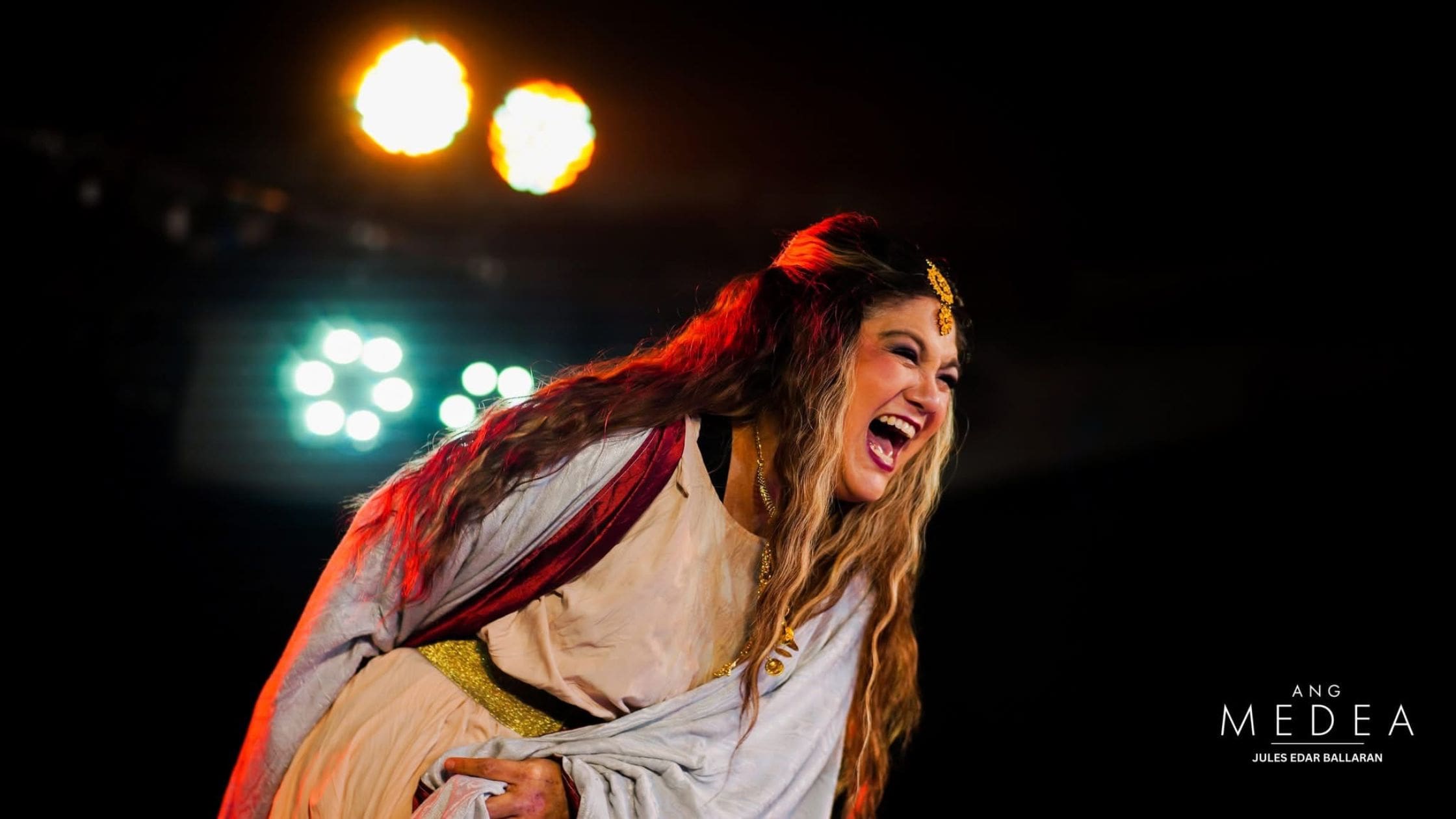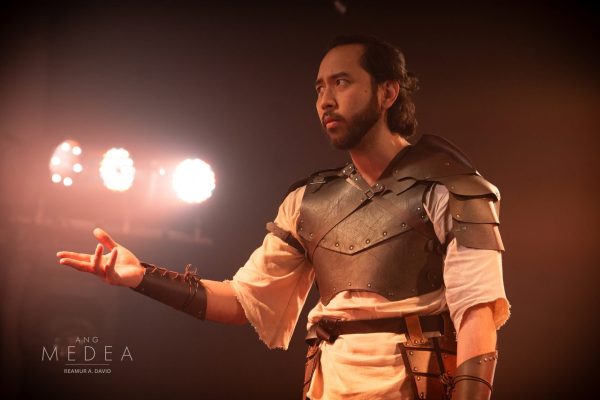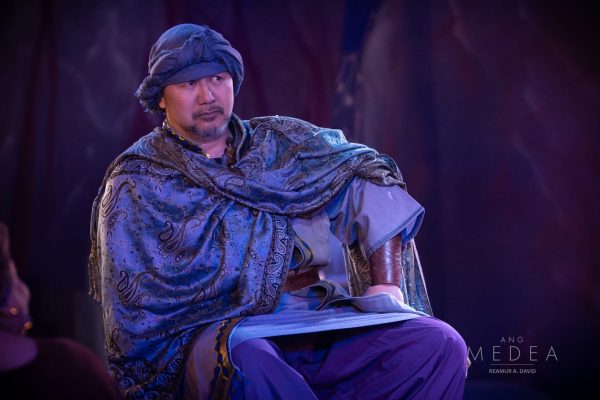
REVIEW: Rage on stage in ‘Ang Medea’
In Ang Medea, fury takes center stage, so consuming that it burns through the layers of Medea’s complex womanhood. Teatro Meron’s adaptation of Euripides’ classic, translated into Filipino by National Artist Rolando Tinio, presents the tragic arc of Medea’s pursuit of vengeance. Directed by Ron Capinding, the production traces her transformation from pain to fury, yet her ultimate display of power lacks the depth needed to fully render her character complex.
The staging is a long stage with two passages on either end. On one end stands a formation of stone-like blocks with a central portal, suggesting the entrance to Medea’s (Miren Alvarez-Fabregas) chamber, where she is seen calling for her children. The opposite side functions as the main entrance and exit for other characters, including Egeo (Joseph Dela Cruz), Yason (Brian Sy), and Creon (Teroy Guzman), as they move in and out of the stage. Despite the simplicity of the set, the costumes evoke a vivid sense of myth—the actors draped in flowing garments and ornate pieces reminiscent of Greek gods and goddesses, grounding the story in its ancient world.
The characters of Yaya (Katski Flores) and the chorus (Gold Soon and Pickles Leonidas) open the play by narrating Medea’s tragic fate, already hinting at the unthinkable act she will later commit. This early revelation shapes how the audience perceives Medea’s descent, framing her vengeance not as a shocking culmination but as an anticipated outcome of her growing anguish. What was meant to deepen the tragedy ends up softening it: by the time Medea executes her vengeance, the audience has already been prepared for it.
With this, the audience are left not in suspense of what will happen but in how her circumstances lead her to the path of revenge.
Heart of the matter
The strength of Medea lies in its exploration of gendered power dynamics within the most intimate of spaces: marriage. Introduced as a capable woman who once saved and helped Yason succeed in his missions, Medea is gradually diminished by emotional betrayal, which fuels the play’s central dramatic tension. Additionally, the irony of female power is stark: her abilities inspire fear and mistrust, even from those in positions of authority like King Creon, showing how her strength isolates rather than empowers her.

Brian Sy as Yason; Photo Credit: Reamur A. David
At the core of the production is a clear focus on Medea’s vengeance, which is further amplified through Yason’s character. Brian Sy’s performance emphasizes Yason’s entitlement and pragmatic self-interest, positioning him as the source for Medea’s rage. His dismissive lines, such as his claim that life would be far less burdensome if men could bear children without women, are performed in a way that sharpens Medea’s sense of betrayal. The production uses Yason not to elicit moral debate but to heighten the emotional stakes of Medea’s vengeful trajectory, providing a clear thematic counterpoint that makes her fury feel inevitable.
Motherhood on the margins
The play touches on Medea’s role as a mother, but this aspect of her womanhood feels underdeveloped. While the production shows her wavering before her final act, the emotional weight of that hesitation feels limited because we rarely see moments that reveal genuine tenderness toward her children or reflect on what they mean to her beyond the context of betrayal.
With the narrative firmly centered on amplifying Medea’s vengeful resolve, her maternal side is largely absent. Early in the play, Yaya and the chorus mention that Medea hates her children, hinting that her resentment toward Yason is already spilling over onto them. This framing makes her eventual willingness to sacrifice them feel consistent with how the play builds her character, but it also narrows her emotional depth. The climax becomes less a moment of moral struggle and more an extension of the rage present from the start, leaving the audience with a Medea consumed by vengeance rather than a complex mother torn between love and fury.

Joseph Dela Cruz as Egeo; Photo Credit: Reamur A. David
Joseph Dela Cruz delivers a compelling performance as Egeo, bringing intensity to the scenes in which he dramatically reenacts the deaths of the royal family. His presence on stage commands attention, and he convincingly conveys the weight of these tragic events. However, the character himself remains largely functional, existing primarily to recount the deaths rather than actively influencing Medea’s moral dilemma or choices. Outside of his two scenes on stage—visiting Medea and agreeing to accept her in Athens and relaying the fate of the royals—Egeo has little impact on the narrative, serving more as a vehicle for exposition than as a fully integrated character.
Doubts of empowerment
Miren Alvarez-Fabregas delivers a compelling performance as Medea, seamlessly shifting between anger, sorrow, and disappointment. She also powerfully conveys Medea’s cunning and unempathetic side, particularly as she moves closer to achieving her revenge. One of the most striking moments occurs when Medea stands on a staircase, looking down at Yason, who kneels and weeps, blaming her, his hatred intensified.
In this scene, Medea appears transformed: her costume shifts to a black dress with red gloves, and her expression is dominated by a sly, triumphant smile. While the moment marks her vengeance, it also strips away much of her complexity and humanity, as she openly declares that the sacrifice of her children is worth it and justified. As the play concludes with the other characters watching her with fear and uncertainty, the staging emphasizes Medea’s relentless pursuit of revenge, highlighting more her cunning over her emotional depth. In the end, Ang Medea burns bright with fury, but leaves behind the ashes of her humanity.
Tickets: PHP 2,000
Show Dates: November 13-28, 2025
Venue: The Mind Museum, Special Exhibition Hall, Bonifacio Global City
Running Time: approximately 1 hour and 40 minutes (no intermission)
Company: Teatro Meron
Creatives: Euripides (Playwright), Ron Capinding (Director), Rolando Tinio (Translator), Tata Tuviera (production designer), Ara Fernando (make-up designer), Zak Capinding (sound designer), Ian Bautista (lighting designer), and Santi Caruncho (graphic artist)
Cast: Miren Alvarez-Fabregas (Medea), Brian Sy and Yan Yuzon (Yason), Joseph Dela Cruz (Egeo), Teroy Guzman (King Creon), Katski Flores (Yaya), Joel Macaventa (Maestro), Pickles Leonidas and Gold Soon (chorus)


Comments